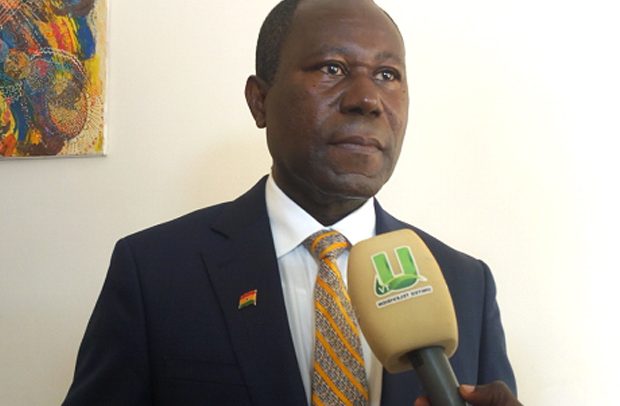Joseph Boahene Aidoo – CEO of COCOBOD
REGULATORS OF the cocoa industry from Ghana and Ivory Coast yesterday began negotiations with international traders of the produce, as well as global chocolate and confectionary manufacturers for higher cocoa prices for farmers in these two countries.
According to the Ghana Cocoa Board (COCOBOD) and its Ivorian counterpart, Le Conseil du Café du Cacao – the two regulatory bodies hosting the meeting on behalf of their respective governments – incomes for smallholder farmers who collectively laid the foundation for cocoa production in their countries, compared to the amount of profits realised in the industry, were a pittance.
The two-day meeting which ends today is taking place at the Movenpick Hotel, Accra.
Joseph Boahen Aidoo, Chief Executive Officer (CEO) of COCOBOD, in a welcome address, advocated a balance between sustainable cocoa production and a reasonable living income based on a fair price for smallholder cocoa farmers.
He said the meeting had been jointly called in response to key indicative areas under the framework of the 2017 Ghana – Cote d’Ivoire declaration on cocoa inspired by President Akufo-Addo and President Alassane Ouattara – presidents of the two countries.
“The single item agenda for today and tomorrow is to establish a living income which we propose to achieve through the floor price, an FOB price that will enable the farmer meet his operational costs in a responsible and sustainable manner and have a margin for the upkeep and maintenance of his household and still have the margin for any investment of his choice.
“Whereas more than enough consensus has been lost on various cocoa platforms on the need to have a better price, and remunerative income for cocoa farmers, the whats and hows have continued to remain elusive,” he stated.
Referring to recent ICCO meetings in Berlin 2018 and Abidjan 2019, where he said the issue of decent income was high on the agenda, the price situation has remained same.
“From my personal observation for the past two years and a half at the international conferences of the Cocoa Merchants Association of America and the World Cocoa Foundation, the cocoa price question has featured in all instances. These conferences, however, have not given the farmer any hope of stability regarding the price.”
He said given the neglect accorded the issue, deforestation in cocoa producing countries had gone worse while child labour was on the ascendency, adding that “smallholder farmers are the most disadvantaged.”
Since 2016, the price of cocoa has seen a steep decline from over $3000/ton to below $1900/ton, he stated.
Kone Brahima Yves, Director General of Le Conseil du Café du Cacao, Ivory Coast, in a speech, expressed the belief that the two-day collaboration would give birth to a general consensus for the improvement of the incomes of smallholder farmers.
Dr Owusu Afriyie Akoto, Minister of Food and Agriculture, commenting on the issue, said the toil of smallholder cocoa farmers laid the foundation for the cocoa industry, yet it was least rewarded.
Calling for an adequate compensation for the farmers, he called on stakeholders to ensure that both upstream and downstream players had decent remuneration to propel them to work harder to meet market demands.
“Majority of farmers in both countries live in deplorable conditions, which serve as a disincentive for continuing to sustain their work. Farmers do not have the means to renew their cocoa capacity and they see such constraints as a threat to the sustainability of cocoa production,” Mr. Akoto said.
“The temptation of alternative incomes will push farmers to switch to other cash crop areas that will satisfy their economic needs. Let’s avoid entrenched positions and consider the living incomes of cocoa farmers,” he added.
Mamadou Sangafowa Coulibaly, Minister of Agriculture and Rural Development of Ivory Coast, in a remark, called for the need to relook the distribution of incomes along the cocoa value chain, adding that out of the $120 billion profits that are realised in the cocoa industry worldwide, only 6 per cent go to producing countries.
BY Samuel Boadi


